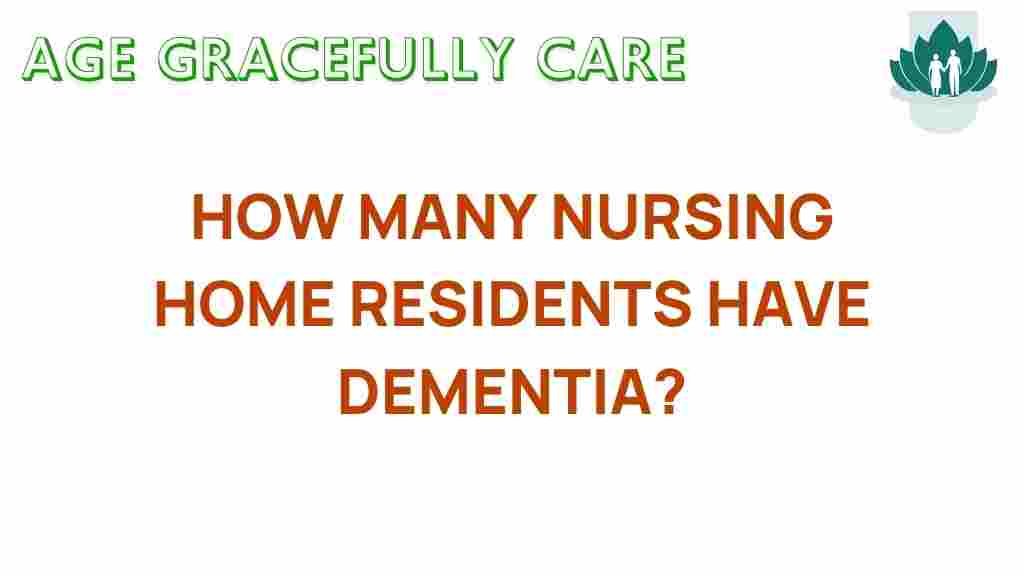Unveiling the Truth: How Many Nursing Home Residents Have Dementia?
Dementia is a term that encompasses a range of cognitive decline conditions, affecting millions of people globally, particularly the elderly. Understanding how dementia impacts nursing homes is crucial for improving elderly care and mental health services. This article will explore the statistics surrounding dementia in nursing homes, the implications for caregiving, and the overall state of health in residential care settings.
The Prevalence of Dementia in Nursing Homes
Statistics indicate that a significant percentage of nursing home residents suffer from dementia. According to recent studies, approximately 50% to 80% of residents in nursing homes have some form of dementia, including Alzheimer’s disease, which is the most common type.
To grasp the magnitude of this issue, consider the following key points:
- About 5.8 million Americans are living with Alzheimer’s disease, a number projected to rise as the population ages.
- Approximately 70% of nursing home residents have cognitive impairment.
- The incidence of dementia increases significantly with age; those over 85 are at the highest risk.
Understanding Dementia and Its Impact on Elderly Care
Dementia affects various cognitive functions, including memory, reasoning, and communication abilities. This decline necessitates specialized elderly care that accommodates the unique needs of residents with cognitive impairment.
In nursing homes, the presence of dementia influences:
- **Caregiving Approaches**: Caregivers must be trained to handle the complexities of dementia, ensuring they can provide adequate support and maintain the dignity of each resident.
- **Health Monitoring**: Residents with dementia are at a higher risk for other health problems, requiring vigilant health assessments and interventions.
- **Environment Design**: Nursing homes must create a safe and navigable environment to reduce confusion and agitation among residents.
Statistics: The Numbers Behind Dementia in Nursing Homes
Examining the statistics surrounding dementia and nursing homes reveals vital insights into the challenges faced by both residents and caregivers. Here are some significant findings:
- Global Prevalence: The World Health Organization (WHO) estimates that over 55 million people worldwide live with dementia, with numbers expected to rise to 78 million by 2030.
- U.S. Statistics: In the United States, about 1 in 3 seniors die with Alzheimer’s or another form of dementia.
- Caregiver Impact: Family caregivers of individuals with dementia provide an estimated 18 billion hours of unpaid care annually, valued at $244 billion.
Challenges Faced in Caregiving
Caregiving for dementia patients in nursing homes poses several challenges, including:
- **Behavioral Issues**: Residents may exhibit aggression, confusion, or withdrawal, complicating caregiving efforts.
- **Emotional Toll**: Caregivers often experience high levels of stress and burnout due to the demands of providing care for individuals with dementia.
- **Communication Barriers**: As dementia progresses, residents may struggle to communicate their needs, making it difficult for caregivers to provide appropriate assistance.
Step-by-Step Process for Effective Caregiving in Nursing Homes
To enhance the quality of care for dementia patients in nursing homes, a structured approach can be beneficial. Here is a step-by-step process:
Step 1: Assessment
Conduct a thorough assessment of each resident’s cognitive abilities, behavior patterns, and health status. This will help in creating a personalized care plan.
Step 2: Training for Caregivers
Provide ongoing training for caregivers focusing on:
- Understanding dementia and its various forms.
- Effective communication strategies with residents.
- Behavioral management techniques.
Step 3: Create a Supportive Environment
Design the nursing home environment to be safe and supportive, including:
- Clear signage and wayfinding aids.
- Quiet areas for relaxation.
- Engaging activities tailored to residents’ abilities and interests.
Step 4: Regular Health Monitoring
Implement a routine for regular health checks to monitor physical and mental health, ensuring early intervention if issues arise.
Step 5: Family Involvement
Encourage family members to participate in care planning and activities, helping to maintain connections and support for the resident.
Troubleshooting Tips for Common Caregiving Challenges
Even with a structured approach, caregivers may encounter challenges. Here are some troubleshooting tips:
Managing Agitation
When a resident becomes agitated:
- Remain calm and speak softly.
- Identify triggers and try to remove them.
- Engage the resident in a calming activity, like listening to music.
Handling Communication Difficulties
If a resident struggles to communicate:
- Use simple, clear language.
- Encourage non-verbal communication, such as gestures.
- Be patient and give them time to respond.
Addressing Health Issues
If health concerns arise:
- Consult with healthcare professionals promptly.
- Keep track of any changes in behavior or physical health.
- Document incidents to identify patterns that may require intervention.
Conclusion
Understanding how many nursing home residents have dementia is essential for improving elderly care and mental health services. With a substantial percentage of nursing home residents living with dementia, it is crucial to implement tailored caregiving strategies that address their unique needs.
By leveraging statistics and adopting effective caregiving practices, nursing homes can enhance the quality of life for residents with dementia. It is a collective responsibility—families, caregivers, and the healthcare system must work together to support this vulnerable population.
For more information on dementia and caregiving strategies, visit Alzheimer’s Association for resources and support. If you are interested in learning more about elderly care options, check out our comprehensive guide.
This article is in the category Health and created by AgeGracefullyCare Team

1 thought on “Unveiling the Truth: How Many Nursing Home Residents Have Dementia?”